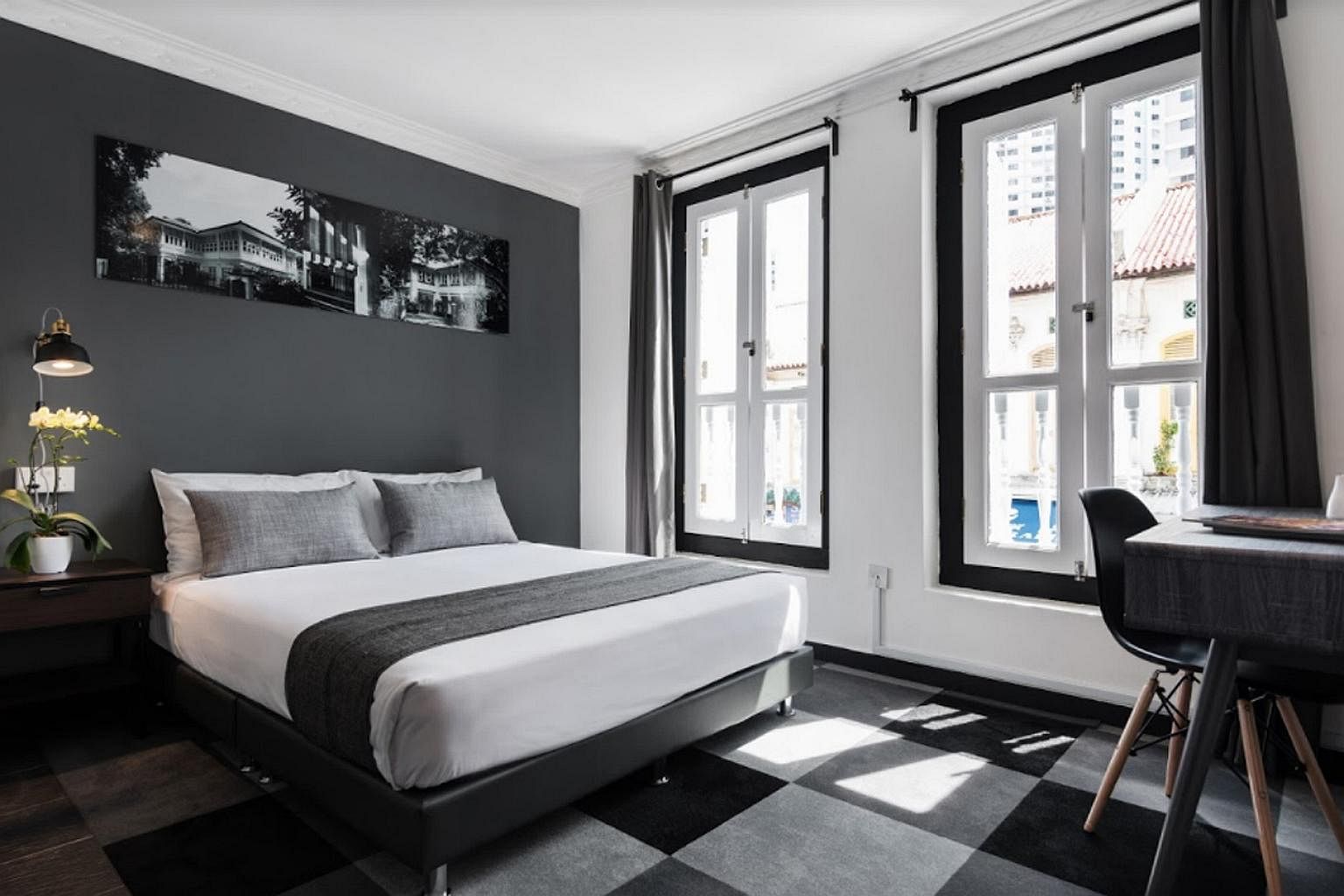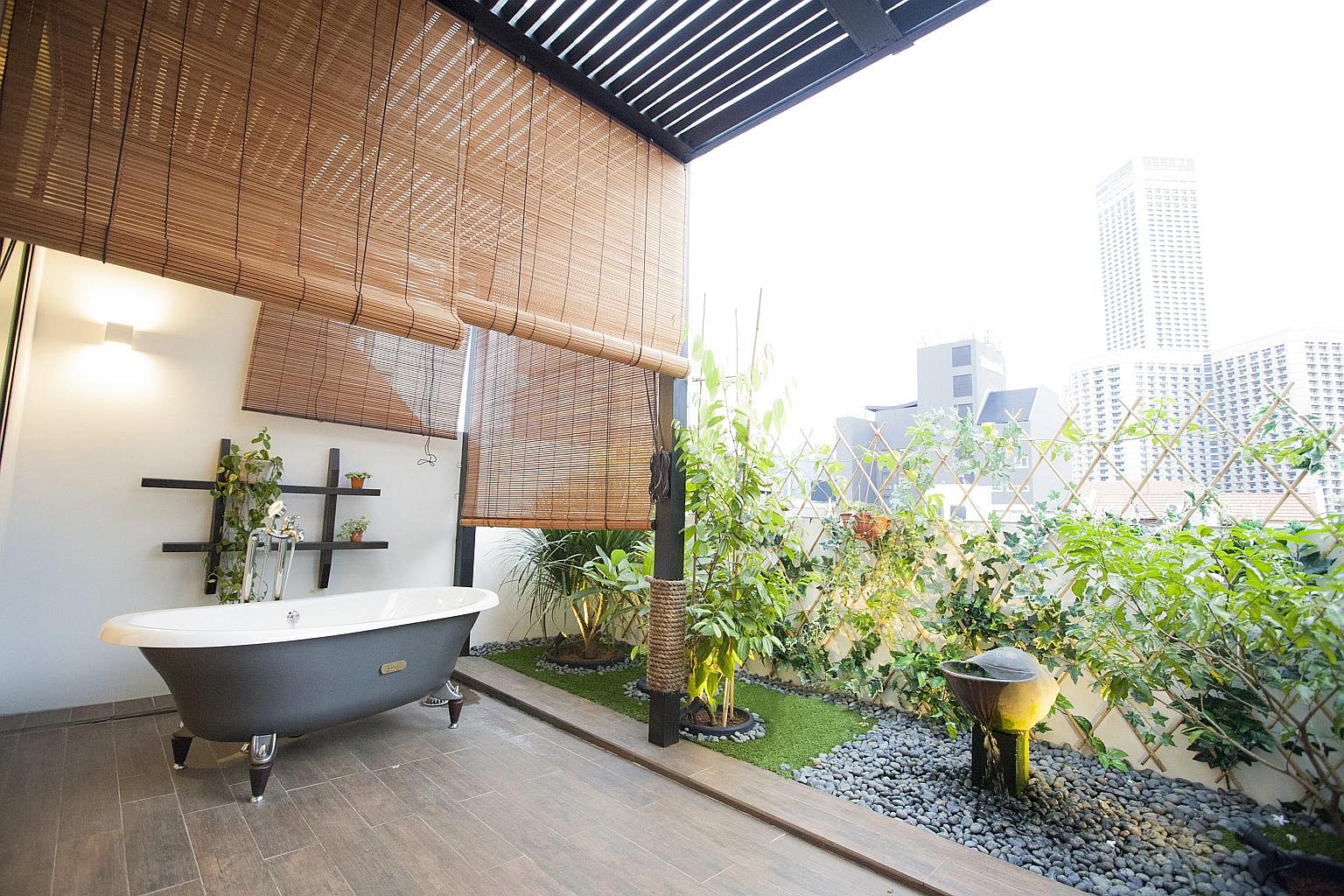SINGAPORE - A termite infestation in some rooms and its restaurant. Patches of waterlogged carpet and a broken glass panel in a room.
That was the extent of disrepair that front office manager and shareholder Chieng Chiew Huang discovered when he took over Hotel 1929 this May.
The hotel located along Keong Saik Road was previously run by Q Loft, a budget hotel chain. It had been leasing and operating the hotel, formerly known as Q Loft Hotel1929 @ Chinatown, since 2019.
Business was good before the pandemic and rooms were always full, says Ms Ariel Chen, one of Q Loft Hotels' directors.
But when occupancy fell to 30 per cent due to Covid-19, the company broke its lease about six months early.
"We are a small player and didn't have deep enough pockets to carry on," says Ms Chen of the company, which began running budget hotels here in 2018. She adds that the company gave up one hotel to save its other three in Bedok, Geylang and near Rochor.
With leisure travel largely on hold for the past 18 months, small hotels have been hit hard.
In the first quarter of this year, economy and mid-tier hotels saw their revenue per available room (RevPAR) fall by 56 per cent to 58 per cent year on year, according to figures released by the Singapore Tourism Board. This was a sharper drop than upscale and luxury hotels, whose RevPAR fell by 52 per cent to 54 per cent.
RevPAR is an industry term used to measure the overall success of a hotel, and refers to its ability to fill available rooms at an average rate.
Reasons for the drop are manifold.
Unlike larger hotels that lean on food and beverage offerings and can house guests on stay-home notice or quarantine order, small players without an in-house restaurant rely mainly on room rates - and have slashed these heavily to remain competitive in a market segment that was price-conscious even before the pandemic.
Despite their best efforts, staycationers have slowed to a trickle as the pandemic wears on.
Luxury and budget hoteliers alike agree that staycation fatigue is a real threat, though it seems to have hit harder for the latter.
Mr Adil Mubarak, vice-president of operations for hotel management and booking platform RedDoorz, says: "Hotels like us are not the first choice. It is understandable because we don't have facilities such as in-room dining or bathtubs."
These factors have led to multiple properties shuttering over the past year.
RedDoorz, which leases and operates budget hotels here, is down to six properties in Singapore compared with 17 last March.
GPS Alliance Holdings, which deals with real estate, also ran into trouble operating Hotel 1887 in Chinatown. It gave up the hotel in May this year after losses of $100,000 to $110,000 each month.
The company currently owes a seven-figure sum to its landlord at Hotel 1887, says Mr Ben Tan, one of the company's directors. He is also one of the shareholders of Hotel 1929.
'Dealt very bad cards'

Even up to last October, however, things were looking up for Hotel 1887. In the second half of last year, the 80-room property was able to fill about 70 per cent to 80 per cent of its rooms with inbound travellers serving their stay-home notice (SHN). Many of them were Malaysian workers.
But when border measures were tightened and these travellers had to serve SHN at dedicated facilities, it sounded a death knell for the property.
Failing to qualify as a dedicated SHN facility, the hotel launched new concepts to target a younger crowd. It created a glamping package, redecorating some rooms with sleeping bags, throws, cushions and board games. This, however, yielded "zero bookings".
Another promotion, where the hotel offered gift baskets containing drinks and snacks as part of the room rate, proved only marginally more successful, bringing in a total of six to eight bookings over three months.
"Even with all this, we were still losing money," says Mr Tan, who negotiated a reduced sum and a repayment period of 18 months with the landlord.
He adds: "We were dealt very bad cards because of the pandemic, but we will make things right and pay back the debt."
Not all properties suffered as badly. But even those in the black say their margins, on a downward trend before the pandemic, have thinned even further.
"Our customers tend to shop based on utilitarian aspects such as location and price. You can't blame hotels in this segment for wanting to push down the price to sell a room," says Mr Ng Aung San, who runs the 31-room Park 22 Hotel in Little India.
Competition has become even stiffer as hotels attempt to woo the domestic crowd.
Mr Ng has cut rates from about $120 to $80 a night since 2019.
Costs, meanwhile, have gone up - a double whammy of the pandemic.
Mrs Shirley Lim, founder of NuVe Group which operates seven boutique properties including Hotel NuVe Bugis, says border measures mean manpower is in short supply.
Three of her staff have left for higher-paying roles at more upscale establishments and hiring new ones costs about 10 per cent to 15 per cent more.
Cleaning and housekeeping costs have risen.
And online travel agents such as Agoda and Booking.com continue to charge a commission of about 15 per cent to 18 per cent.
New clientele a lifeline
Despite their troubles, hoteliers are determined not to give up the ghost.
They have turned to new guest profiles to fill rooms, such as construction workers, Malaysians residing here or people relocating to Singapore needing a temporary place to stay.
When Covid-19 spread like wildfire across migrant worker dormitories last year, RedDoorz marketed its properties to construction companies looking for alternative accommodation for their workers.
From last March to this January, about 60 per cent of guests comprised migrant workers, says Mr Adil.
Most of these workers have since returned to the dormitories as the Covid-19 situation improved, though one company has been renting the entire RedDoorz Hostel @ Kallang MRT, operating at 50 per cent capacity with 30 beds, since this February.
Other hotels such as Park 22 Little India and Hotel Calmo, which has two branches in Bugis and Chinatown, attract long-term guests through platforms such as property portal Propertyguru and roommate-matching community Roomies.sg.
To cater to such guests, many hotels install washing machines and dryers on their premises.
Last year, while housing migrant workers, RedDoorz opened up a central kitchen to supply breakfast bento boxes at about $5 each.
"With revenue down, we had to strategise and relook our approach," says Mr Adil.
But while long-term guests fill rooms, hotels earn significantly less a night from each one.
Checks by The Straits Times showed that monthly rates at two- to three-star hotels range from about $1,000 for a single room to $1,600 for a twin or king room.
This works out to between $40 and $55 a night - about half the rate of a single night's booking. Hoteliers say this is just enough to cover rental and operating costs.
Meanwhile, winning over staycationers requires a different approach. "We always have to offer something more to guests, some kind of different experience," says Mrs Lim of NuVe Group, who has been in the industry since 2004.
The group has decked out rooms at various properties in romantic decor; offers free drinks and snacks from the mini-bar; and rents out video and board games to guests.

Hoteliers have also outfitted rooms with new amenities, which they hope will entice guests.
After sprucing up the building he took over, Mr Chieng of Hotel 1929 recently purchased smart televisions for about half the rooms.
Meanwhile, Q Loft this month added a hot tub to one of its rooms to attract local guests, and intends to retrofit more rooms if there is demand.
The SingapoRediscovers Vouchers (SRV) scheme, meant to encourage domestic spending and offer a boost to the ailing tourism industry, has helped somewhat.
Mr Ng of Park 22 Hotel says the scheme has driven demand, to the tune of about 1,200 room nights booked since last year.
Others, such as Ms Chen of Q Loft, are less upbeat.
"The SRV scheme tends to benefit upscale five-star hotels more, as they can provide lots of facilities and dining options," she says.
The company gets about five to eight SRV bookings every month at Q Loft @ Mackenzie, and none at its Bedok and Geylang properties.
Hoteliers say that while the SRV scheme has been of limited help for hotels in their sector, any additional revenue is welcome.
Ultimately, they will need borders to reopen if they are to survive.
Heavily reliant on South-east Asian tourists before the pandemic, small hotel owners grimly agree that it is a waiting game for travel to pick up once more.
Even the recent Vaccinated Travel Lane scheme has failed to make a significant impact on bookings.
"At present, it is about maintaining fiscal discipline and retaining jobs," says Mr Ng.
Mrs Lim is realistic about NuVe Group's prospects.
"No one thought the pandemic would last almost two years and counting. If larger-scale leisure travel does not resume and neighbouring countries do not open up, I don't know how we will survive."












